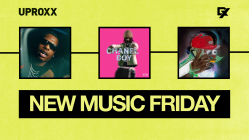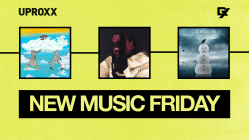In the tradition of these legendary Rap stars hailing from the West, Glasses Malone spits about a gangster lifestyle over hard-hitting beats. Though not near the stratosphere of any of those greats, his content comes from the same Killer-California mentality that took N.W.A. out of the Compton streets, ripping through posters, to show mainstream America how they could express themselves, to their fullest capabilities. In 2011’s Beach Cruiser, Malone seems like more of a throwback than a new jack, more of a memory than the future, but he bangs.
Banging, of course, can mean several things. For Malone, this means gang banging, representing the “Blu Division,” as Snoop calls it on “Eastsidin’.”  Not simply trying to ride his beach cruiser through the Cali traffic, Snoop’s “nephew” then takes “A-Town drums” over on the Akon-led “Certified” to show his tracks can bang also, this time referring to the thump of the DJ Toomp produced track. The Cataracs also provide this with the infectious “I Get Doe,”
Not simply trying to ride his beach cruiser through the Cali traffic, Snoop’s “nephew” then takes “A-Town drums” over on the Akon-led “Certified” to show his tracks can bang also, this time referring to the thump of the DJ Toomp produced track. The Cataracs also provide this with the infectious “I Get Doe,”  before things settle back down to a laid back G-stroll on “Car Wash,” a track dedicated to the constant reminder of death and unity that exists when family members and friends create car wash fundraisers for the dead. Speaking of the dead, Malone dedicates a cut to deceased musical icons on the touching “Club Heaven” where he pictures The Notorious B.I.G. and Tupac Shakur co-headlining in the afterlife. As the album ends, Terrace Martin provides more of the necessary thump on “Feel Good Muzik,” an Oldies-inspired cut perfect for riding the beach cruiser home as the ever-present California Sun sets, a suiting and soothing end to a hard, heavy album.
before things settle back down to a laid back G-stroll on “Car Wash,” a track dedicated to the constant reminder of death and unity that exists when family members and friends create car wash fundraisers for the dead. Speaking of the dead, Malone dedicates a cut to deceased musical icons on the touching “Club Heaven” where he pictures The Notorious B.I.G. and Tupac Shakur co-headlining in the afterlife. As the album ends, Terrace Martin provides more of the necessary thump on “Feel Good Muzik,” an Oldies-inspired cut perfect for riding the beach cruiser home as the ever-present California Sun sets, a suiting and soothing end to a hard, heavy album.
It’s not like there aren’t bumps on the road. For some fans, the first may be Malone’s voice, one that sounds eerily familiar to Game’s. The next bump comes in the form of content and message. While some may enjoy the soundtrack to the streets (“Dope,”  “Off Safety” “No Sympathy”
“Off Safety” “No Sympathy”  ), others may find it monotonous and uninspired, at times. This message is also one that lies in the hearts of many in the streets, a mixture of emotions that contradict one another. While “Club Heaven” laments the loss of legends, many of the album’s other cuts show there’s no hesitation to shoot others. This type of mixture makes for a lack of cohesion that will stand out to listeners in search for more introspection. Moreover, some tracks could have helped the album by not being on it, including the odd homage to T.I. titled “Call Me T.I.”
), others may find it monotonous and uninspired, at times. This message is also one that lies in the hearts of many in the streets, a mixture of emotions that contradict one another. While “Club Heaven” laments the loss of legends, many of the album’s other cuts show there’s no hesitation to shoot others. This type of mixture makes for a lack of cohesion that will stand out to listeners in search for more introspection. Moreover, some tracks could have helped the album by not being on it, including the odd homage to T.I. titled “Call Me T.I.”  There’s also a pothole hit by the timing of the album, which was originally started around 2006-2007. While some music stands the test of time, it’s hard not to notice when it doesn’t, particular when rhyme references no longer apply. The bumps along the way take away from the overall album, but it’s not all lost.
There’s also a pothole hit by the timing of the album, which was originally started around 2006-2007. While some music stands the test of time, it’s hard not to notice when it doesn’t, particular when rhyme references no longer apply. The bumps along the way take away from the overall album, but it’s not all lost.
Malone has a long way to go to stand next to legends in the West, but Beach Cruiser shows Malone’s ride isn’t over. With unpolished rhymes, a gutter flow and street-centered approach, it’ll be interesting to see what he does when label woes don’t interfere with his path.










Terribly overrated rapper. Both of his albums this year proved how mediocre he really is.
This is his debut release? I loved the album. Well worth the money.
Nah, he had an album with Wack 10 this year.
Nice album,regardless of what this review state
Garbage.
club heaven is a banger
Bit disappointed with this album. Beats are poor. Look out for an artist by the name of Fedi De Marco.
Dope Album.
The Saigon formula did not work here at all. Nobody wants this album.
They should’ve worked Slaine’s harder.
Saigon formula??
I think he’s referring to Sub-Noize’s approach on promotion for these albums. Agree, the slaine album was crazy
it was pretty meh, the mack & malone album was better than this
now this album is coming out?
1 star for the big delay
http://soundcloud.com/ess500/kill-in-um-soundwav-tag
weak effort from Asses Malone
this is gangsta rap at its best yall trippin
You want some classic gangsta shit?? Go bump that Jayo Felony album…
Ouch you seriously referenced Jayo Felony
DOPE
How you going to use another rapper’s name…you can call me T.I.? make other rappers use you as the example. Rick Ross used the MC Hammer song, but everyone understood the point. Not like he idolized or looked up to Hammer, it was a play with how big he did things. But Hammer was over, fallen, used as a metaphor of partying up. T.I. is still in the game and this dude idolizing him is saying T.I. is better than me. Isn’t hip hop about trying to be the best? I found the the songs to be ok, but that song ruined the whole album for me. Second, he’s using Rick Ross style (so apparent) from Mc Hammer, just a slowed down version…wow…if that song wasn’t on, i would have given 3.5, but i have to give this album a one when you call another rappers name like you’re on his dick. Who authorized the bs like that? He should show his real gangsta and take them to the back of the studio and gauge them.
I question if people on this site really understand and appreciate hip hop. Hes not saying hes on his dick, and besides TI is hardly in the game anymore his reign is over, he aint been on in 3 years. Hes just shoutin out an OG hustla givin props not sayin that TI is better than him, its called appreciating a legend and showin respect. Yall are trippin thats the tightest song on here
ymcmb dont know what to do with a l.a rapper……………
damn this shit is wack . that song Call me T.I ? WTF lame song .
he’s just like Jay Rock there both nothing special at all . no substance , no flow , unoriginal beats . 1 star
and im westcoast
Everone on this site is a fuckin hater. Thats one of the best songs on the album, clever and well put together, any fan of hip hop would appreciate an homage to an OG hustler like that
trash
Stop hatin on gangstarrap and gtfhoh !Listen to your fakeass poprap and stop bullshittin!
No question the kid is nice and no doubt he gets busy- I’m not talking about him but Ali Lafayette Rhea. One Love
Dog is tight, can’t wait to hear more
this shit was dope felll bad cause i got this free but willl buy the next one
this is one of the best albums you people who shittin on ma folk can’t rap anyway all yall think the west coast is full of jerk music real gangdta rap needs to come bacc thanks Jay Rock, Nipsey,and G.Malone for breathin life bacc into a diein west